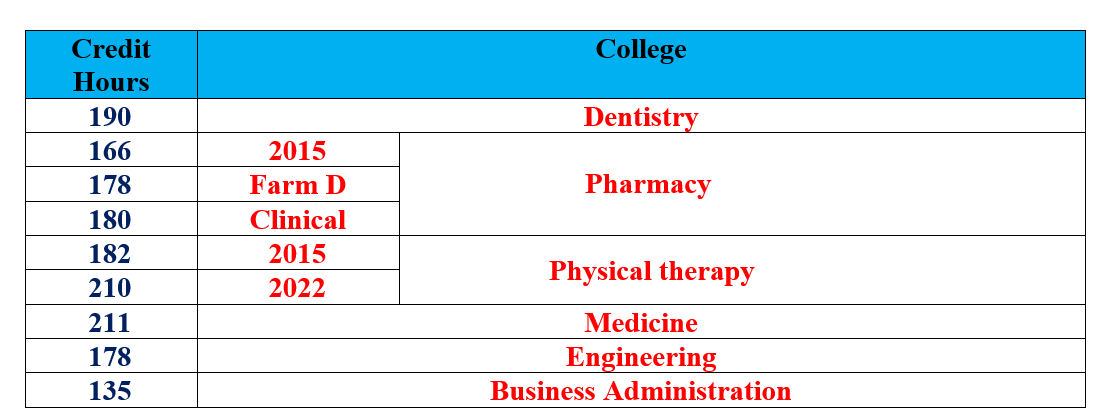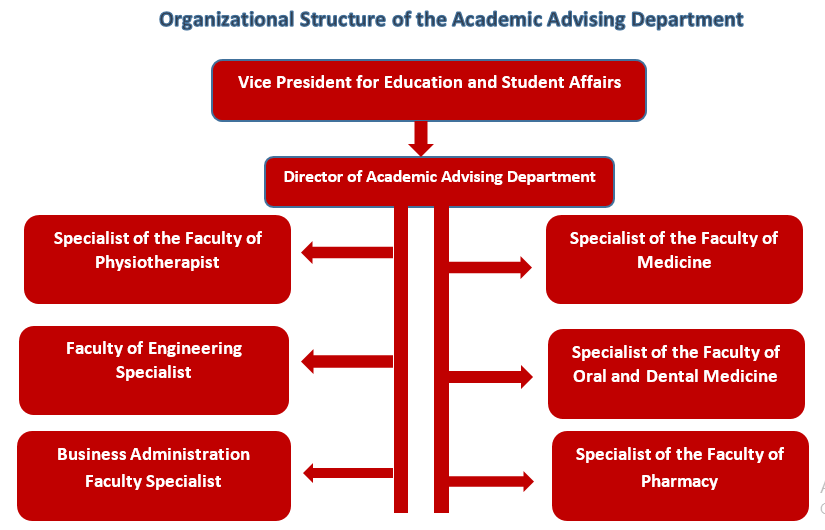Academic Advising
Academic Advising Tasks
Discussing the student’s academic tendencies, guiding him towards programs and specializations that are consistent with his inclinations, helping him choose the courses he registers, and guiding him to determine the appropriate academic load for him in each semester, according to his circumstances, abilities, and preparations. The opinion of the academic advisor is considered advisory, and the student is responsible for the courses in which he registers based on his desire.
Follow up the student’s performance in the courses he registered for throughout the academic year and record all the necessary data about the student and the results obtained.
Placing the student who is struggling academically under observation for one semester, while reducing his academic load, after the approval of the College Council based on the recommendation of the Education and Student Affairs Committee.
Helping the student in all psychological, social and professional aspects to achieve success by directing him to the Student Support Office.
Studying the academic case of each student uniquely, which varies from one student to another.
The academic advisor is familiar with all the information of the student supervising them academically, starting from their personal data, attendance, regularity in study, warnings, in addition to exam grades and work for the year.
Academic Advising Rules
Academic Advising System
The College Council or whoever is authorized by the Council (Academic Advising Department) shall distribute the students enrolled in the college into groups, and each group shall have an academic advisor from the faculty members and their assistants who is responsible for direct communication with students, guiding them and assisting them in registering the courses of their choice, deleting and adding in line with the system approved by the College Council and its regulations.
The College Council determines the tasks and responsibilities of the academic advisor and announces them to faculty members, their assistants and students.
Academic Load
The student registers the courses in at least the number of credit hours according to each regulation, and the College Council may approve exceeding the maximum limit in necessary cases.
The outstanding student can exceed the maximum registration by a certain number of credit hours per semester and a maximum number of certain credit hours throughout all academic years (5 levels) in additional optional specialized courses from the study plan of the program, with the approval of the academic advisor and the College Council and in accordance with each regulation.
A student who has achieved a cumulative average of less than a cumulative average of 2 is not allowed to register in more than a certain number of credit hours, according to each regulation.
4- The maximum academic load in the summer semester is a certain number of credit hours, and in the last summer semester the student may register 12 credit hours under the graduation requirements.
Academic Advising Mechanisms
- Before the start of each semester, the student submits the registration of courses through a counselor, after consulting his academic advisor and fulfilling the conditions for registering each course.
- The student is committed to the university calendar issued by the college at the beginning of the semester, and the registration of students for courses is completed in the first week of the start of the semester.
- A student who was unable to register for compelling reasons accepted by the College Council may register late during the additional period of registration, which is the second week of the start of the semester.
- The student may not register in a course that has previous requirements until after studying and succeeding in it, and the College Council may approve the registration of the student who failed in a previous requirement if it is urgent to register, provided that the student has committed to attend lectures, laboratories and exams of the previous course and in cases the student may register a course in conjunction with his previous requirement if he has studied the previous requirement success or failure or his graduation depends on that.
- The student must re-register in the courses in which he failed, and the course is performed in study and exam.
- The student has the right to re-register a course he studied and passed it before with a rate not exceeding 2 for the purpose of improvement.
- The College Council determines the minimum number of students to register for each course.
- The student may, after the approval of the academic advisor, amend the registration of courses, whether by addition, deletion or replacement, during the first three weeks of the start of the study (the period specified by the College Council and in accordance with the approved university calendar) without prejudice to the academic load stipulated in the regulations.
- The student may, after the approval of the academic advisor, withdraw from studying one or more courses within eight weeks at most from the start of the study specified by the College Council and in accordance with the university calendar, without prejudice to the academic load stipulated in the regulations and is not considered to have exceeded the permissible absence rate before withdrawing, and this course is recorded in the student’s academic record with a grade of (withdrawn without failing) and the withdrawal is not included in the calculation of the average points of his semester grade.
- If the student withdraws after the specified period, he is considered a failure in the course and receives a grade of “fail” in (F), this grade is included in the calculation of the average points of his semester and cumulative grade.
- Cases of emergency withdrawal after this date shall be presented to the Education and Student Affairs Committee for consideration and approval by the College Council.
- The student may withdraw from a semester due to the circumstances of illness or with an acceptable compulsive excuse, by submitting a request to the Admission and Registration Department, and in the event that the excuse is accepted and the College Council approves the withdrawal, these courses are not included in the average points of his estimation, and he must re-register the courses from which he withdrew in a subsequent semester.
- The provisions of modifying the registration of courses by deletion, addition or withdrawal from them do not apply to courses registered during the summer semester.
Organizing the academic advising process
- The Academic Advising Department organizes and follows up the advising process in coordination with the Admission and Registration Department, where the Academic Advising Department is provided with electronic lists of new students.
- The coordinator of the academic program shall distribute the students to the academic advisors according to the lists from the beginning of the students’ enrollment in the college.The student continues under the supervision of the academic advisor until graduation, and the student’s dependency can be adjusted (if necessary).
- Students are distributed so that each group of thirty (30) students has an academic advisor.Struggling students continue with the primary mentor regardless of academic level so that they are not referred to a new mentor.
- In the event of disability or need, members from educational departments can be used: curricula, pedagogy, comparative education, and mental health.
- The academic advisor submits a periodic report to the Academic Advising Unit.
Credit Hours System
The academic system in the program offered by each college at Horus University is based on the Credit Hours system within the framework of the semester.
Study system
– The academic level (academic year) is divided into two main semesters of 15 weeks each, each followed by the final exam, and the two main semesters are separated by the mid-year vacation.
– The College Council may, in specific cases, approve the opening of an intensive (third) summer semester of 8-9 weeks, including the exam period, provided that the weekly teaching hours allocated to each course taught in the summer semester are doubled, and the student is not allowed to register in this semester for more than 9 credit hours.
The cases in which the student is allowed to register voluntarily in the summer semester are:
- Not meeting the maximum academic load in either of the two main semesters.
- His desire to re-study courses that he has previously studied and failed.
- His desire to raise the grades of previously studied courses to improve the overall average of CGPA points.
- If this registration results in the possibility of changing the student’s status to move to a higher level.
- Completion of graduation requirements.
Credit Hours System
The credit hour is a unit of measurement for determining the weight of each course and is equal to a theoretical lecture of one hour per week, or a lesson in the form of applications and theoretical exercises, discussions and dialogue, laboratory exercises of two hours per week, or a period of field exercises of four hours per week throughout the semester.
During the study period, the student must pass the number of credit hours in each college separately according to the following table: –

Dealing with defaulting students
Defaulting student
It is the student who has a cumulative average of less than 2 after a full academic year of joining the university and is placed under academic probation for one academic year and renewed for another year with the approval of the Dean of the College, and the defaulting student is identified by reviewing the results of the previous semester immediately after the announcement of the result by determining the cumulative average for each student.
Methods of discovering and mechanism of helping the irregular student and dealing with academically stumbling cases
- After reviewing the results of the mid-term exams, the defaulting students are identified, and an inventory is made of them.
- The Academic Advising Department instructs the student to withdraw from the semester courses in order to maintain the cumulative average.
- Conducting a questionnaire on the reasons for stumbling and then informing the college and the student support office of the result to take the necessary action.
- The Academic Advising Department assists the Academic Adviser to make improvement plans for struggling students.
- After the end of the semester, academic warnings are delivered to the counselors to inform the guardian and students and complete their signatures.
- The need to communicate with parents through the academic advisor, and sometimes the guardian is called to meet with the vice dean or dean of the college.
- Academic warnings are sent by Egypt Post and students’ e-mail in coordination with the Admission and Registration Department.
Suggestions to help struggling students solve their problems
- Work on intensifying meetings to increase the announced office hours to discuss students who are struggling with their scientific problems.
- If the reasons for the stumbling are social or psychological problems, parents are contacted to try to find solutions to these problems in coordination with the Student Support Office and the academic advisor.
- In cases of emergency health or social conditions (deaths, accidents, operations-………….), the student is instructed to withdraw courses – postpone courses to maintain the cumulative average.
- The academic load of the struggling student is reduced with the possibility of opening course registration in the summer semester to raise the student’s cumulative average.
Dealing with defaulting students
There are mechanisms for dealing with defaulting students in coordination with the Student Support Office and the academic advisor, namely:
The university has established a student support unit to help academically struggling students with less than (GPA2), as well as students with special social circumstances, students in need of psychological guidance and guidance, and those who are struggling in the English language.
- Identify academic problems during the semester from academic supervisors and from the results of periodic assessment tests and the results of mid-term exams.
- Inquire about students who had to withdraw some materials to find out the causes of the problems and try to overcome the obstacles they face.
- Those who exceeded the permissible absence rates, take the necessary action and follow up on what has been done.
- Students who have been exposed to some events that affect academic achievement try to solve some of their problems such as overcoming the absence rates due to their emergency circumstances and making compensatory lectures.
This is to identify students who face academic stumbling to match them with family, psychological and health factors that affect academic achievement to identify the causes of stumbling and find appropriate solutions to them.
- The level of students is monitored based on the results of the interdisciplinary exams and the work of reports for students and the Office of Academic Advising
- Helping to communicate between students and their supervisors to cooperate in solving some of their problems
- Trying to reach the reasons that led to this stumbling such as (stumbling in comprehension of the English language – poor English language – poor academic achievement – distance of parents – neglect by the student – family problems – health problems and others …)
- Follow up on individual cases suffering from psychological strikes, make a case study for them, support them morally, give them a boost of self-confidence and tranquility, and check their conditions from time to time.
How to deal with students' problems
- Conducting a case study as well as interviews for students who need it to identify the causes of problems and cooperate in solving them.
- Communicate with students and their supervisors to strengthen communication and cooperation in solving some of their problems.
- Making a monthly follow-up form for defaulting students to determine their academic level as well as progress in general achievement and analyze monthly.
- Conducting courses in English as well as some subjects such as chemistry to raise the level of students.
- Conducting reviews for students in all subjects, especially subjects that showed poor achievement rates.

Organizational Structure of the Academic Advising Department

To contact and get more information

Prof. Ibrahim Saber
Board of Trustees Chairman
welcome everybody who participates in building a future for our own country to help it take a considerably distinctive place among nations.

